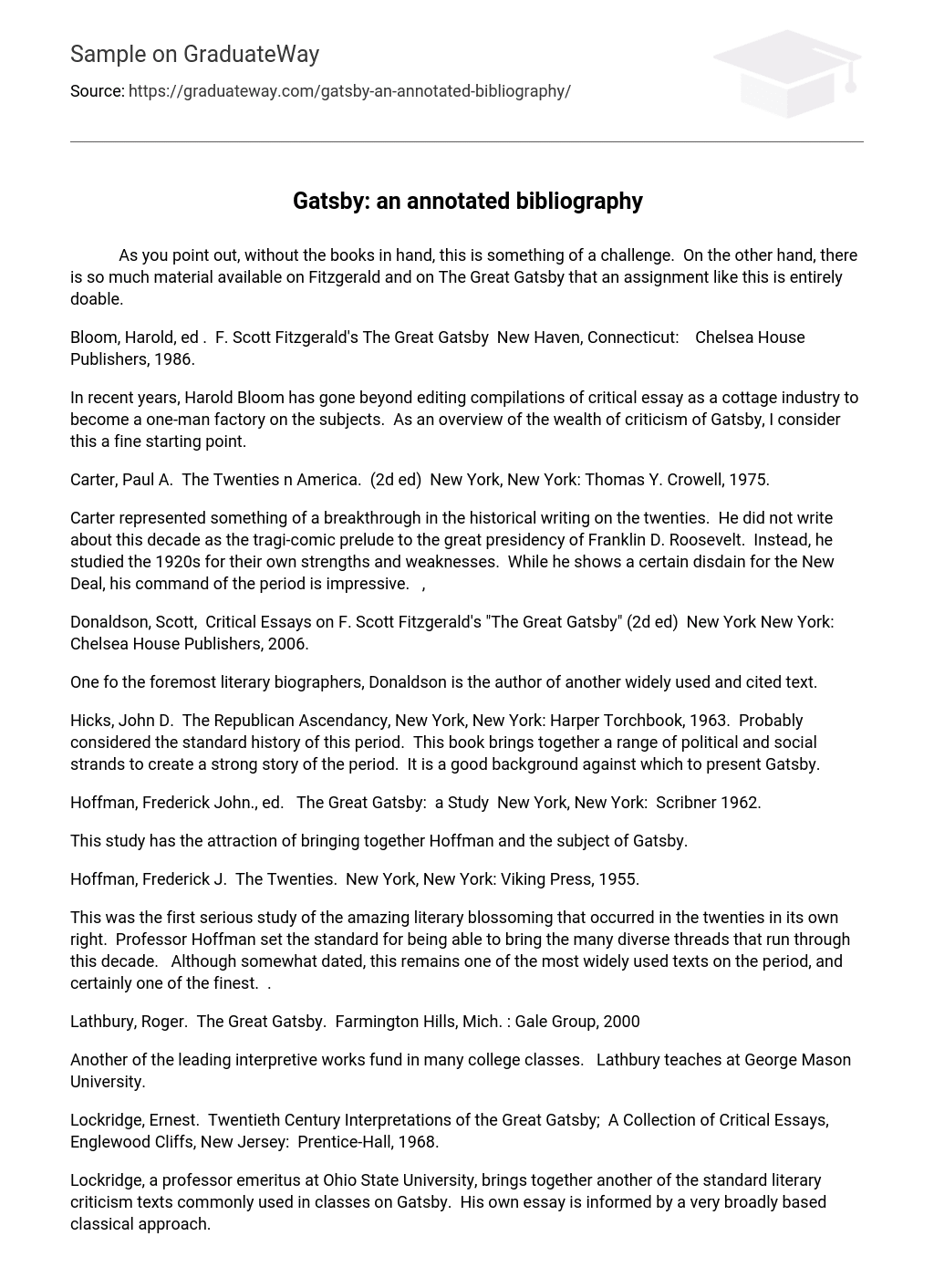As you point out, without the books in hand, this is something of a challenge. On the other hand, there is so much material available on Fitzgerald and on The Great Gatsby that an assignment like this is entirely doable.
Bloom, Harold, ed . F. Scott Fitzgerald’s The Great Gatsby New Haven, Connecticut: Chelsea House Publishers, 1986.
In recent years, Harold Bloom has gone beyond editing compilations of critical essay as a cottage industry to become a one-man factory on the subjects. As an overview of the wealth of criticism of Gatsby, I consider this a fine starting point.
Carter, Paul A. The Twenties n America. (2d ed) New York, New York: Thomas Y. Crowell, 1975.
Carter represented something of a breakthrough in the historical writing on the twenties. He did not write about this decade as the tragi-comic prelude to the great presidency of Franklin D. Roosevelt. Instead, he studied the 1920s for their own strengths and weaknesses. While he shows a certain disdain for the New Deal, his command of the period is impressive. ,
Donaldson, Scott, Critical Essays on F. Scott Fitzgerald’s “The Great Gatsby” (2d ed) New York New York: Chelsea House Publishers, 2006.
One fo the foremost literary biographers, Donaldson is the author of another widely used and cited text.
Hicks, John D. The Republican Ascendancy, New York, New York: Harper Torchbook, 1963. Probably considered the standard history of this period. This book brings together a range of political and social strands to create a strong story of the period. It is a good background against which to present Gatsby.
Hoffman, Frederick John., ed. The Great Gatsby: a Study New York, New York: Scribner 1962.
This study has the attraction of bringing together Hoffman and the subject of Gatsby.
Hoffman, Frederick J. The Twenties. New York, New York: Viking Press, 1955.
This was the first serious study of the amazing literary blossoming that occurred in the twenties in its own right. Professor Hoffman set the standard for being able to bring the many diverse threads that run through this decade. Although somewhat dated, this remains one of the most widely used texts on the period, and certainly one of the finest. .
Lathbury, Roger. The Great Gatsby. Farmington Hills, Mich. : Gale Group, 2000
Another of the leading interpretive works fund in many college classes. Lathbury teaches at George Mason University.
Lockridge, Ernest. Twentieth Century Interpretations of the Great Gatsby; A Collection of Critical Essays, Englewood Cliffs, New Jersey: Prentice-Hall, 1968.
Lockridge, a professor emeritus at Ohio State University, brings together another of the standard literary criticism texts commonly used in classes on Gatsby. His own essay is informed by a very broadly based classical approach.
Lynn, David Hayden. The Hero’s Tale : Narrators In The Early Modern Novel. New York, New York: St. Martin’s Press, 1989.
Lynn is editor of The Kenyon Review, and a highly regarded author and critic. His book is a collection of essays on the heroic figures in early modern novels, including Gatsby, The Good Soldier, and several others. This book is frequently cited in academic articles, indicating that major writers find it an excellent reference.
Piper, Henry Dan, comp.; Fitzgerald’s the Great Gatsby: the Novel, the Critics, the Background. New York, New York: Scribner 1970.
While less known than some others listed here, this is certainly a study worth considering.
If any of the listed resources are not usable, there are others which will certainly properly listed.





